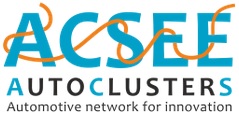- Search term must have more than 2 characters.
Autoclusters

- Project name: AutoClusters
- Lead partner: Automotive Cluster - West Slovakia (Slovakia)
- Project partners: AC Serbia-Automotive Cluster (Serbia), Vienna Region (Austria), Business Interest Association ACS, Automotive Cluster of Slovenia (Slovenia), Technical University of Gabrovo (Bulgaria), Center for Research and Telecommunication for NETworked Communities (Italy), Experimentation for Networked Communities (Italy), Croatian Automotive Cluster (Croatia), Panac-Pannon Automotive Cluster (Hungary), Comunimprese Scarl (Italy), "Gheorge Asachi" Technical University of ISI.BD.D (Romania)
- Duration: 04/2009 - 03/2012
- DEX Innovation Centre’s role: The author of project idea and external expert of lead partner Automotive Cluster - West Slovakia (support in technical assistance and management issues).
Project description
The clustering activities proposed by the project are oriented on the activities, which are improving the innovation capacities in the region and improve technology and know-how transfer – improving the innovation circle. The project analysed the clusters development and best practices across the regions. During the project activities, which promoted automotive industry, one permanent exchange program was carried out. Exchange study visited with more than 200 participants. Exhibitions at universities with more than 3000 participants were organized. Project summarized experience and know-how to the common methodology which was elaborated close to the project closure to help in other regions and different industries in the second level clustering focused on innovation.
The study on clusters development in SEE was done in the beginning of the project describing best practices across the region, news in EU policies and identifying basic SWOT analysis for each partner region. The study on innovation and cooperation with R&D in automotive industry was realized to find the areas where the cooperation between SMEs, universities, big companies and public bodies is possible. More than 200 R&D and innovative capacities in South-East Europe were identified and inserted into the online Database. Base on the results of the study has been organized educational seminars for improvement of the capacities of the stakeholders.
Based on the analysis of the automotive sector in the SEE region was established 4 working groups in specific areas and worked on the project proposal for pilot actions. Three pilot projects were chosen for funding and been successfully implemented:
- Automotivenets (networking activities and propagation of automotive industry)
- Electromobile infrastructure analysis in South East Europe (the first analysis of such kind in SEE region)
- Open Access Platform for cooperation between innovation actors in the automotive industry (creation of communication platform for support of exchange of experience and cooperation on common projects).
On the base of small projects' implementation, four FP7 project proposals were prepared in cooperation with the relevant R&D organizations, firms, and universities during project implementation. Additional trainings for FP7 project proposal development were organized. One of them was selected for funding (www.fastincharge.eu) and was successfully implemented within the FP7 programme.
Deliverables
1. Innovation Trends and Challenges and Cooperation Possibilities with R&D in Automotive Industry
“R&D study” is divided into 3 main chapters that could help to build and create automotive network in SEE. In the first chapter we analysed the basic world automotive trends and orientation of R&D in automotive industry. There are research findings about automotive R&D capacities in project partners´ countries/regions. The second part of the R&D study is focused on basic characteristics of automotive industry. The last chapter is oriented on setting up recommendations for automotive industry in SEE, topics for educational seminars and presentations in the frame of the project and other results of the analysis of automotive industry.
Innovation Trends and Cooperation Possibilities
2. Social Dialogue in Automotive Sector in South-East Europe
The general objective of the research was to realize a comparative study on social dialogue through industrial relations with a special focus on automotive sector in partners’ countries, using different methods: literature analysis, interviews, focus groups, and case studies.
Social Dialogue in Automotive Sector in SEE
3. Summary of Best Practices Across Regions and SWOT Analysis
The study summarizes and presents those best practices which project partners had chosen to show and share its experiences each other. There are 16 issues from nine partners. (Only from the Croatian partner has not been sent any template.) The study compares best practices from South-East European countries regarding the automotive industry. The key point was to determine those parameters which are typical in case of all (or almost all) in order to define a common SWOT analysis. The summary stands for two main chapters. In the first chapter is presented the identification of best practices and in the second is described the coherency of selected quantitative indicators. In each part are highlighted the common, significant parameters.
Summary of Best Practices across Regions and SWOT Analysis
